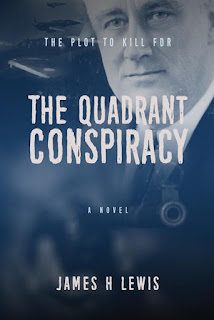James H. Lewis is the author of the new historical novel The Quadrant Conspiracy, which is set during World War II. His other novels include Novak's Quest. A former journalist, he lives in Pittsburgh.
Q: You write that you were inspired to write this novel by something you read in your friend Philip Padgett's book Advocating Overlord. Can you say more about that?
A: I’m always on the lookout for inspiration. Whenever I’m reading a newspaper, I clip stories I find interesting. All my Chief Novak police procedurals contain fictionalized versions of actual crimes. I have more ideas than I’ll ever be able to develop into plots.
In Advocating Overlord, Phil Padgett relates the tug of war between Roosevelt and Churchill over how to end the Third Reich. FDR was under domestic pressure to end the war in Europe so we could defeat Japan, whose attack had drawn the U.S. into an unpopular war. He was pressing for a cross-Channel invasion of France to drive into the heart of Germany. Churchill had seen so many losses at Gallipoli during the Great War and Dieppe early in WW2 that he pushed for a more cautious approach.
All this was to come to a head at the Quadrant Conference in Québec in August 1943. Weeks before the conference, Churchill announced he was arriving early to meet with FDR. Roosevelt was tired of being strong-armed, so he left town and literally went fishing at a small island north or Lake Huron.
Phil writes that FDR planned to return via a scenic route along the Ottawa River, but “there had been a security alert. An escaped German prisoner of war … had been recaptured … near the railway in North Bay, Ontario, through which Roosevelt’s train would have passed. FDR’s train instead retraced its route….”
Those few words stopped me. “What if?” I wondered. I wrote Phil to say a thrilling plot was hiding in his history. He immediately knew what I was talking about and offered to help.
Q: How did you research the novel, and what did you learn that especially surprised you?
A: Phil send me hundreds of pages of research he’d done for his history. He was incredibly generous. I then immersed myself in the period, reading nearly two dozen books, studying online resources such as the FDR Library, and reading Canadian newspapers from the period to get a feeling for the times.
I reviewed the correspondence between Roosevelt and Churchill and even Roosevelt and Joseph Stalin. I asked questions of Canadian military experts on Quora and wrote to businesses in Gravenhurst, where some of the action takes place.
Since the protagonist was himself captured during the Second Battle of Ypres, I even went back to the Great War. Using a plotting program, I built a timeline of key events during the period between July 1942 and September 1943, then built the plot around that.
Many things surprised me, but one sticks out, which became a central element of my protagonist’s character. When Canadian prisoners of war were repatriated after the Great War, they were treated as pariahs, much as the U.S. treated returning Vietnam veterans. The public perceived that while their fellows were wounded or dying, they had sat out the war with the enemy. Nothing could have been further from the truth, of course, but the Canadian War Museum documents all this.
Q: What did you see as the right blend between fiction and history as you wrote the book?
A: I used history as the background for the story. I have quoted FDR and Churchill where possible. Where not, I’ve invented dialogue that reflects what they must have said at certain points.
In the end, though, the history is merely the framework for the story of my protagonist, Brandon Armitage, coming to terms with himself—his resentment over what he lost as a POW and the effect it’s had on his marriage. It’s really a personal story.
Q: What do you hope readers take away from the story?
A: I hope they get so immersed in the history that they track back to the book that inspired it, Phil Padgett’s Advocating Overlord. Beyond that, however, I hope they see in Brandon Armitage and his wife a bit of themselves. I hope the story makes people more aware of the obstacles others are facing in their lives.
Q: What are you working on now?
A: I wrote a story for Kindle Vella called "Belonging," that deals with an unwelcome discovery unearthed by a DNA test. I’m publishing it next year as a small novel. It’s a subject I want to explore in greater depth. And I’m busy outlining what may be the final book in the Chief Novak series of Pittsburgh-based police procedurals. And, of course, I keep clipping articles for story ideas I’ll never have the time to write.
Q: Anything else we should know?
A: My grandkids are both reading books well above their grade level. I used to read to them. Now they read to me. It’s important to take the time to listen.
--Interview with Deborah Kalb. Here's a previous Q&A with James H. Lewis.


Let me take this opportunity chance to congratulate Mr.James Lewis for his work of art, it's a very nice novel for sure; Hope to get many of his work and read them! Thanks for a very nice interview,so amazing!
ReplyDelete